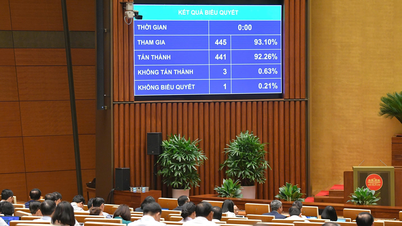 |
| National Assembly deputies participated in voting to pass the Law on Digital Technology Industry. |
The Law on Digital Technology Industry (CCNNS) is not only a specialized law, but is also expected to be an institutional lever for the national digital transformation process. This is a golden time for Vietnam to build a proactive legal foundation, paving the way for domestic technology enterprises to develop firmly, integrate deeply and contribute to creating a new position for Vietnam in the digital age. Vietnam also became the first country in the world to promulgate a separate law on the field of CNCNS.
The CNCNS Law has promptly institutionalized many important contents in Resolutions No. 57-NQ/TW and Resolution 68-NQ/TW of the Politburo , such as: Promoting, providing incentives and supporting the development of digital technology enterprises, especially private enterprises; developing high-quality human resources and digital technology talents; developing essential and shared digital technology infrastructure; supporting innovative startups; building an ordering mechanism and building a legal framework for controlled testing...
In addition, the CNCNS Law also presents a number of major problems and solutions for the CNCNS industry to become a key economic driver with a growth rate 2-3 times higher than GDP. The CNCNS Law provides special preferential policies and breakthrough solutions. Projects with large investment capital enjoy corporate income tax reduction incentives for many years, financial support from the Development Investment Fund, and research and development (R&D) costs are calculated double, even triple for small and medium enterprises.
Administrative procedures are simplified through the mechanism of decentralizing the authority to establish digital technology industrial parks to provincial People's Committees and applying the "green channel" customs priority regime. The State prioritizes investment in essential infrastructure such as data centers and 5G networks, while encouraging private enterprises to participate in developing modern infrastructure. The domestic market is expanded by promoting the use of "Make in Vietnam" technology products in budget projects and strategic technology development orders.
Increasing Vietnam's share in the CNCNS industry
The CNCNS Law focuses on increasing the proportion of domestic technology products in the industry through strategic solutions and specific support policies. Foreign-invested enterprises (FDI) are encouraged to transfer technology and cooperate with domestic enterprises through corporate income tax incentives for many years if they meet this requirement. Domestic startups receive 50% funding support to purchase advanced technology and develop prototypes, helping to improve the production capacity of “Make in Vietnam” products.
Domestic digital technology products are given priority in state budget projects, ensuring a stable and sustainable output market. Research and development (R&D) activities are given maximum incentives, including tax exemptions and financial support, to promote creativity and innovation, helping Vietnamese products not only meet domestic needs but also be competitive in the international market.
Promoting Vietnamese businesses to the world
The CNCNS Law aims to bring Vietnamese digital technology enterprises to the international market, increase revenue and affirm global brands. The “Make in Vietnam” program is standardized, implementing trade promotion activities and supporting enterprises to expand foreign markets. Domestic digital technology products are prioritized in public procurement projects, creating a solid foundation for developing the domestic market before expanding internationally.
Projects with large investment capital enjoy preferential corporate income tax reduction for many years, financial support from the Development Investment Fund, and exemption from import tax on high-tech equipment. In particular, the State builds a network of Vietnamese CNCNS representatives in key markets, combined with international cooperation programs, helping Vietnamese enterprises gradually become multinational companies, competing equally with large technology corporations in the world.
Increase the proportion of enterprises using CNCNS
To promote digital transformation and increase the proportion of enterprises applying CNCNS, the CNCNS Law implements comprehensive solutions to improve efficiency and competitiveness. The CNCNS Development Program supports enterprises through promotion activities, digital skills training and providing technology solutions suitable for each industry. The State also provides financial support and costs for deploying digital technology for small and medium-sized enterprises, creating a favorable environment for digital technology to penetrate deeply into all economic sectors.
Increase the number of CNCNS enterprises to 150,000 by 2035
In order to build a strong CNCNS business ecosystem with the goal of reaching 150,000 enterprises by 2035, the Law provides comprehensive support policies. Small and medium-sized enterprises are supported with infrastructure investment costs, high-quality human resource training, and priority to participate in bidding for public procurement projects. In terms of finance, the State supports investment capital for special projects and funding for technological innovation, helping enterprises improve their creativity and competitiveness. CNCNS production projects and supporting enterprises receive tax incentives similar to those in particularly difficult areas, while attracting foreign investment to increase production capacity. The development of CNCNS zones with attractive incentive policies creates an environment for businesses to start up and develop sustainably, contributing to realizing this strategic goal.
Mastering core technology and strategic digital technology
To ensure autonomy in core technologies, strategic digital technologies and ensure national security sovereignty in technology, the CNCNS Law focuses on mastering core technologies and strategic digital technologies. Research and development (R&D) activities enjoy the highest incentives, including corporate income tax exemption for R&D projects and financial support for building advanced research infrastructure. The State orders enterprises to develop strategic technologies such as artificial intelligence (AI), big data, and blockchain, ensuring clear direction and abundant resources. The State budget prioritizes allocation to R&D infrastructure, helping enterprises and research institutes have the conditions to develop core technologies and strategic digital technologies, thereby enhancing Vietnam's position in the global digital technology field.
Forming large CNCNS enterprises
The CNCNS Law aims to create “locomotive” enterprises leading the digital technology industry through strategic policies. The State orders enterprises to research and develop pioneering technologies, while providing financial support and trade promotion to expand international markets. Large enterprises implementing major projects enjoy corporate income tax reduction incentives for many years and investment capital support for key projects. To attract talent, the Law applies a 5-year personal income tax exemption policy for technology experts, a 5-year visa for foreign experts, and special mechanisms on salaries and working environment. These solutions create conditions for the formation of strong CNCNS enterprises capable of leading the Vietnamese digital technology industry to reach the world level.
Promoting innovative startups
To encourage innovation and develop creative startups in the field of CNCNS, the CNCNS Law implements practical support policies. Small and medium-sized enterprises are supported with infrastructure investment costs, human resource training, and priority in bidding for public projects. The State supports funding for technological innovation, helping startups easily access resources to realize their ideas. The controlled testing mechanism (sandbox) allows businesses to test new products and services within a limited scope, with State supervision, to reduce legal risks and create a favorable environment for innovation. These solutions promote the strong development of the digital technology startup ecosystem, contributing to economic innovation.
Developing the market for digital products and services and digitalizing the entire population
The CNCNS Law aims to bring digital technology to every citizen, develop the digital market and carry out comprehensive digitalization. The State prioritizes public procurement for domestic technology products, while supporting businesses to expand their markets through trade promotion programs. The “Make in Vietnam” program combined with the National Digital Transformation Program provides training support, technology application and digital awareness raising for citizens. Advanced digital solutions such as e-government, online education, and smart healthcare are widely deployed, ensuring that every individual becomes a part of the digital economy, thereby building a digital society, a comprehensive and sustainable digital Vietnam.
CNCNS infrastructure development and standardization work
To build a solid digital infrastructure and establish quality standards, the CNCNS Law encourages private enterprises to invest in infrastructure through tax, land, and credit incentives. The State prioritizes budget for shared infrastructure such as AI data centers, 5G networks, and cloud computing, meeting the needs of the digital economy. Regarding standards, the Law stipulates the development of technical regulations and quality requirements for digital technology products and services, while encouraging the application of international standards, helping to improve the reliability and competitiveness of Vietnamese products. These solutions create a solid foundation for the sustainable development of the CNCNS industry.
Monitor, measure and evaluate performance
The CNCNS Law builds a system to monitor and evaluate the effectiveness of digital technology development through national information system solutions, CNCNS industry databases connecting online data between enterprises and management agencies, ensuring transparent and timely collection and analysis of information to form an online monitoring system. State management is enhanced by establishing development strategies, technical standards, and organizing online inspections and examinations. Performance indicators such as industry growth, the proportion of enterprises applying technology, and contribution to GDP are measured regularly, helping the State adjust policies in accordance with reality, thereby improving national competitiveness.
Building CNCNS ecosystem
To create a strong CNCNS ecosystem, including supply chains and supporting industries, the Law encourages the development of large enterprises through investment incentives and strategic digital technology ordering mechanisms. Supporting enterprises receive financial support, tax reductions, and priority to participate in the digital technology supply chain. Cooperation between large and small enterprises is promoted through technology connection and transfer programs, ensuring a comprehensive development ecosystem, from production to consumption, enhancing Vietnam's competitiveness in the global market.
Implement CNCNS program (Make in Vietnam)
The CNCNS Development Program is regulated by the CNCNS Law to encourage domestic technology innovation and production. Promotion, training, and financial support activities are implemented to help businesses develop products with Vietnamese brands. “Make in Vietnam” digital technology products and services are prioritized in public procurement and support for international market expansion, helping to improve competitiveness. These efforts not only promote technological autonomy but also affirm Vietnam’s position in the global digital economy.
Developing high quality CNCNS human resources
The CNCNS Law has implemented comprehensive solutions and policies for human resource development. High-quality digital technology human resources are exempt from personal income tax for the first 5 years of working in Vietnam, creating a strong financial incentive for them to contribute long-term. Foreign experts are granted 5-year visas and are exempt from work permits, helping to simplify procedures and attract international human resources to transfer technology and share knowledge.
The State supports funding for training and fostering digital human resources through national programs, cooperation with businesses and educational institutions, focusing on improving advanced technology skills, project management and innovation to meet the global market. The law applies special mechanisms on salary, working environment and research support, creating conditions for talents to maximize their capacity.
In particular, the flexible human resource rotation mechanism allows civil servants and public employees from state agencies to be seconded to digital technology enterprises, with their salaries, allowances and positions retained, and can return with priority; experience at enterprises is highly valued, even being the basis for appointment to leadership positions. These solutions not only optimize resources but also build a strong digital technology human resource ecosystem, contributing to mastering core technologies, strategic digital technologies and promoting sustainable development of the industry.
Development and management of Artificial Intelligence
To promote the sustainable, safe and responsible development of artificial intelligence (AI), contributing to enhancing national competitiveness, the AI Law has for the first time introduced general framework policies and assigned the Government to provide detailed regulations. The Law stipulates human-centered principles, ensuring transparency, safety and non-discrimination, with the requirement that AI systems must maintain human control.
AI is classified into high-risk, high-impact, and non-high-risk categories, with high-risk systems subject to strict technical requirements and close supervision. AI products must have clear identification to ensure transparency. Entities that develop, provide, and deploy AI are responsible for managing risks, protecting personal data, and maintaining cybersecurity.
The government prioritizes funding for AI research, building infrastructure such as AI data centers, and supporting businesses through tax and financial incentives to accelerate innovation. International cooperation is encouraged through participation in multilateral forums and agreements, helping Vietnam access advanced technology. These solutions not only help master AI technology but also promote digital transformation, building a smart and sustainable digital economy.
Digital Asset Development and Management
To take advantage of the enormous economic potential of digital assets, while ensuring transparency, security and compliance with international standards, the CNCNS Law for the first time defines and regulates the legal framework for digital assets, including crypto assets and virtual assets, classified by purpose of use and technology, creating a clear legal basis. The Government is assigned to issue detailed regulations, ensuring flexibility and practicality. These solutions not only promote innovation but also build a transparent digital economy, contributing to enhancing national prestige in the global market.
Source: https://huengaynay.vn/chinh-tri-xa-hoi/nhung-diem-moi-luat-cong-nghiep-cong-nghe-so-ky-vong-but-pha-trong-ky-nguyen-so-154684.html
































































































Comment (0)